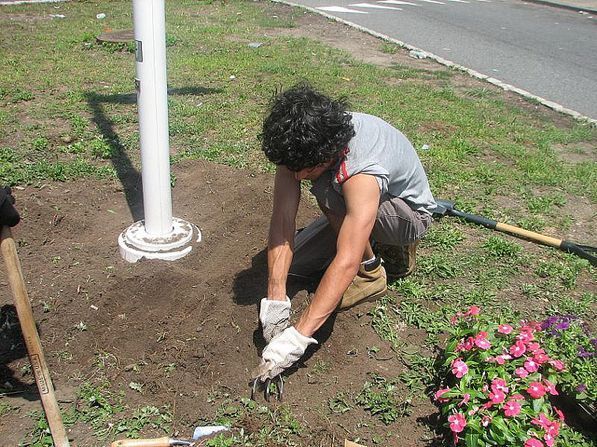Work To Do

At the end of our recent block club meeting in my south Inglewood neighborhood, people who didn't immediately rush home to catch the end of the (ill-fated) Laker game lingered, congregating in the kitchen for vittles and chat that didn't fit the meeting agenda but that feels important nonetheless.
After six years of living here, I still have my reservations about the whole raison d'etre of the block club--a more neutral name for Neighborhood Watch, a.k.a. people in crime-impacted areas building good relations with the police--but I participate. I've decided that my often fractious neighbors getting together regularly for any reason is a benefit to all of us. And embedded somewhere in my subconscious is a crazy hope that this club might plant the modern seeds of a united black front, an American dream that stretches back to Malcolm X and Marcus Garvey. It's a dream that's never quite been realized, let alone sustained, which is why my modest attempt in 2011 feels as valid as any other--if giants like Marcus or Malcolm couldn't get us there, why not the block club?
Over chicken and green salad, one of my neighbors launched into a long complaint about some contract work that was done at her house that was done badly. A common sort of homeowner story. It came out that the offending contractor was a black man, and that my neighbor's bitterness about the shoddy job is intensified by this fact. "I hate to say it, but that's what happens to me when I hire our people," she said. "You want to give them a break, you want to trust that they'll do right...And then this happens. It's not the first time, either. I'm just through with it."
People nodded sympathetically, or uncomfortably, but nobody challenged her. Except me, of course. The back-burner goal of a united black front flared up and urged me on. "But we're not all like that," I said, stating the obvious. I'm not just talking about the contractor; we all stood accused. My neighbor looked at me almost pityingly. "Of course not," she said. She left it there. So two truths hang in the air, that her contractor and other black workers she hired were incompetent, and that not all black people are that way. The two sentiments don't exactly balance each other out. This agitated me, but I knew I wasn't going to get any closure this evening. Probably not next month either.
I thought about something I saw on my morning walk with the dogs last year. I saw a couple of black gardeners unloading equipment off their truck, and the sight was arresting. The vast majority of gardeners and landscapers in Inglewood, and just about everywhere else in L.A., including heavily black neighborhoods like mine, are Latino. That fact was acknowledged by the name of the business that was stenciled on the side of this truck: Revolution Gardening. I have nothing against Latino gardeners, but I applauded these guys in my head. I was encouraged. And the next thing I felt was entirely discouraged, almost embarrassed, by the fact that revolution has come down to this. In my imagined united front, I refused to imagine that fighting the power meant fighting our negative self-conception that's as old as slavery itself. Nor did I imagine that the fighting might have to be done with rakes and lawn mowers.


